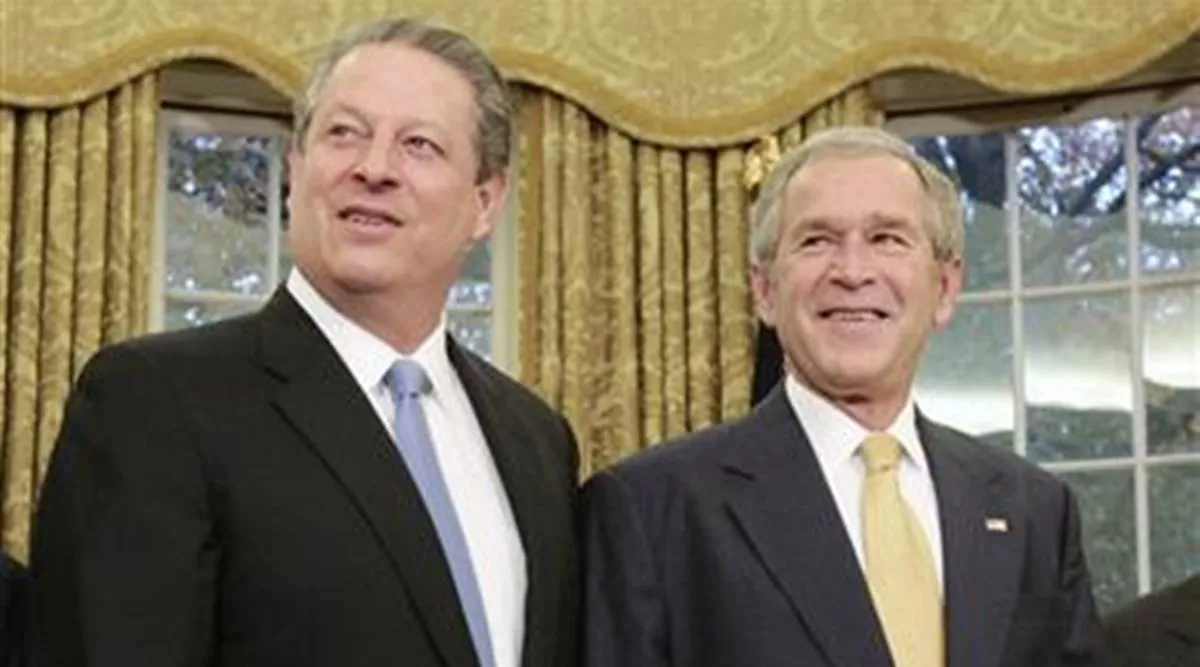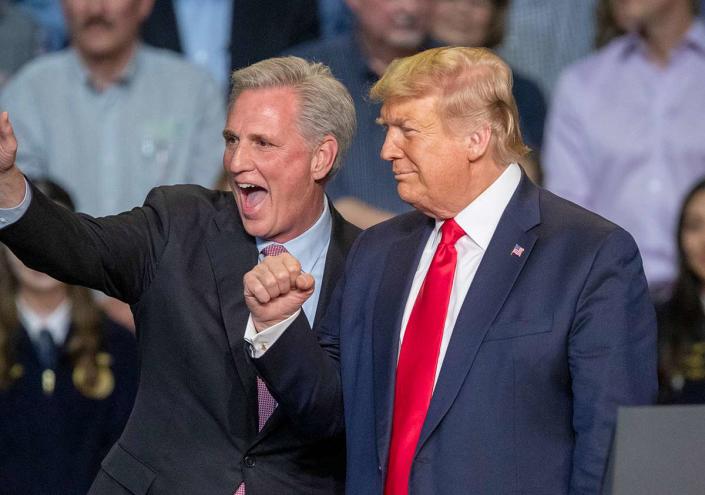It’s been quite a year.
But I had a chance to talk with history podcaster Bob Crawford of the Avett Brothers yesterday, and he asked a more interesting question. He pointed out that we are now twenty years into this century, and asked what I thought were the key changes of those twenty years. I chewed on this question for awhile and also asked readers what they thought. Pulling everything together, here is where I’ve come out.
In America, the twenty years since 2000 have seen the end game of the Reagan Revolution, begun in 1980.
In that era, political leaders on the right turned against the principles that had guided the country since the 1930s, when Democratic President Franklin Delano Roosevelt guided the nation out of the Great Depression by using the government to stabilize the economy. During the Depression and World War Two, Americans of all parties had come to believe the government had a role to play in regulating the economy, providing a basic social safety net and promoting infrastructure.

But reactionary businessmen hated regulations and the taxes that leveled the playing field between employers and workers. They called for a return to the pro-business government of the 1920s, but got no traction until the 1954 Brown v. Board of Education decision, when the Supreme Court, under the former Republican governor of California, Earl Warren, unanimously declared racial segregation unconstitutional. That decision, and others that promoted civil rights, enabled opponents of the New Deal government to attract supporters by insisting that the country’s postwar government was simply redistributing tax dollars from hardworking white men to people of color.
That argument echoed the political language of the Reconstruction years, when white southerners insisted that federal efforts to enable formerly enslaved men to participate in the economy on terms equal to white men were simply a redistribution of wealth, because the agents and policies required to achieve equality would cost tax dollars and, after the Civil War, most people with property were white. This, they insisted, was “socialism.”
To oppose the socialism they insisted was taking over the East, opponents of black rights looked to the American West. They called themselves Movement Conservatives, and they celebrated the cowboy who, in their inaccurate vision, was a hardworking white man who wanted nothing of the government but to be left alone to work out his own future. In this myth, the cowboys lived in a male-dominated world, where women were either wives and mothers or sexual playthings, and people of color were savage or subordinate.

With his cowboy hat and western ranch, Reagan deliberately tapped into this mythology, as well as the racism and sexism in it, when he promised to slash taxes and regulations to free individuals from a grasping government. He promised that cutting taxes and regulations would expand the economy. As wealthy people—the “supply side” of the economy-- regained control of their capital, they would invest in their businesses and provide more jobs. Everyone would make more money.
From the start, though, his economic system didn’t work. Money moved upward, dramatically, and voters began to think the cutting was going too far. To keep control of the government, Movement Conservatives at the end of the twentieth century ramped up their celebration of the individualist white American man, insisting that America was sliding into socialism even as they cut more and more domestic programs, insisting that the people of color and women who wanted the government to address inequities in the country simply wanted “free stuff.” They courted social conservatives and evangelicals, promising to stop the “secularization” they saw as a partner to communism.
After the end of the Fairness Doctrine in 1987, talk radio spread the message that Black and Brown Americans and “feminazis” were trying to usher in socialism. In 1996, that narrative got a television channel that personified the idea of the strong man with subordinate women. The Fox News Channel told a story that reinforced the Movement Conservative narrative daily until it took over the Republican Party entirely.
The idea that people of color and women were trying to undermine society was enough of a rationale to justify keeping them from the vote, especially after Democrats passed the Motor Voter law in 1993, making it easier for poor people to register to vote. In 1997, Florida began the process of purging voter rolls of Black voters.
And so, 2000 came.

In that year, the presidential election came down to the electoral votes in Florida. Democratic candidate Al Gore won the popular vote by more than 540,000 votes over Republican candidate George W. Bush, but Florida would decide the election. During the required recount, Republican political operatives led by Roger Stone descended on the election canvassers in Miami-Dade County to stop the process. It worked, and the Supreme Court upheld the end of the recount. Bush won Florida by 537 votes and, thanks to its electoral votes, became president. Voter suppression was a success, and Republicans would use it, and after 2010, gerrymandering, to keep control of the government even as they lost popular support.
Bush had promised to unite the country, but his installation in the White House gave new power to the ideology of the Movement Conservative leaders of the Reagan Revolution. He inherited a budget surplus from his predecessor Democrat Bill Clinton, but immediately set out to get rid of it by cutting taxes. A balanced budget meant money for regulation and social programs, so it had to go. From his term onward, Republicans would continue to cut taxes even as budgets operated in the red, the debt climbed, and money moved upward.
The themes of Republican dominance and tax cuts were the backdrop of the terrorist attack of September 11, 2001. That attack gave the country’s leaders a sense of mission after the end of the Cold War and, after launching a war in Afghanistan to stop al-Qaeda, they set out to export democracy to Iraq. This had been a goal for Republican leaders since the Clinton administration, in the belief that the United States needed to spread capitalism and democracy in its role as a world leader. The wars in Afghanistan and Iraq strengthened the president and the federal government, creating the powerful Department of Homeland Security, for example, and leading Bush to assert the power of the presidency to interpret laws through signing statements.
The association of the Republican Party with patriotism enabled Republicans in this era to call for increased spending for the military and continued tax cuts, while attacking Democratic calls for domestic programs as wasteful. Increasingly, Republican media personalities derided those who called for such programs as dangerous, or anti-American.
But while Republicans increasingly looked inward to their party as the only real Americans and asserted power internationally, changes in technology were making the world larger. The Internet put the world at our fingertips and enabled researchers to decode the human genome, revolutionizing medical science. Smartphones both made communication easy. Online gaming created communities and empathy. And as many Americans were increasingly embracing rap music and tattoos and LGBTQ rights, as well as recognizing increasing inequality, books were pointing to the dangers of the power concentrating at the top of societies. In 1997, J.K. Rowling began her exploration of the rise of authoritarianism in her wildly popular Harry Potter books, but her series was only the most famous of a number of books in which young people conquered a dystopia created by adults.
In Bush’s second term, his ideology created a perfect storm. His administration's disastrous response to Hurricane Katrina, which killed more than 1,800 people and caused $125 billion in damage in and around New Orleans in 2005, revealed how badly the new economy had treated Black and Brown people, and how badly the destruction of domestic programs had affected our ability to respond to disasters. Computers permitted the overuse of credit default swaps that precipitated the 2008 crash, which then precipitated the housing crisis, as people who had bet on the individualist American dream lost their homes. Meanwhile, the ongoing wars, plagued with financial and moral scandals, made it clear that the Republicans optimistic vision of spreading democracy through military conflict was unrealistic.

In 2008, voters put Black American Barack Obama, a Democrat, into the White House. To Republicans, primed by now to believe that Democrats and Black people were socialists, this was an undermining of the nation itself, and they set out to hamper him. While many Americans saw Obama as the symbol of a new, fairer government with America embracing a multilateral world, reactionaries built a backlash based in racism and sexism. They vocally opposed a federal government they insisted was pushing socialism on hardworking white men, and insisted that America must show its strength by exerting its power unilaterally in the world. Increasingly, the Internet and cell phones enabled people to have their news cater to their worldview, moving Republicans into a world characterized by what a Republican spokesperson would later call "alternative facts."
And so, in 2016, we faced a clash between a relentlessly changing nation and the individualist ideology of the Movement Conservatives who had taken over the Republican Party. By then, that ideology had become openly radical extremism in the hands of Donald Trump, who referred to immigrants as criminals, boasted of sexually assaulting women, and promised to destroy the New Deal government once and for all.
In the 2016 election, the themes of the past 36 years came together. Embracing Movement Conservative individualist ideology taken to an extreme, Trump was eager enough to make sure a Democrat didn't win that, according to American intelligence services, he was willing to accept the help of Russian operatives. They, in turn, influenced the election through the manipulation of new social media, amplified by what had become by then a Republican echo chamber in which Democrats were dangerous socialists and the Democratic candidate, former Secretary of State Hillary Clinton, was a criminal. Thanks to the Supreme Court’s Citizens United decision which permitted corporate money to flow into election campaigns, Trump also had the help of a wave of money from big business; financial institutions spent $2 billion to influence the election. He also had the support of evangelicals, who believed he would finally give them the anti-abortion laws they wanted.
Trump lost the popular vote by almost 3 million votes but, as George W. Bush before him, won in the Electoral College. Once in office, this president set out to destroy the New Deal state, as Movement Conservatives had called for, returning the country to the control of a small group of elite businessmen who, theoretically, would know how to move the country forward best by leveraging private sector networks and innovation. He also set out to put minorities and women back into subordinate positions, recreating a leadership structure that was almost entirely white and male.
As Trump tried to destroy an activist government once and for all, Americans woke up to how close we have come to turning our democracy over to a small group of oligarchs.
In the past four years, the Women’s March on Washington and the MeToo Movement has enabled women to articulate their demand for equality. The travel ban, child separation policy for Latin American refugees, and Trump’s attacks on Muslims, Latin American immigrants, and Chinese immigrants, has sparked a defense of America’s history of immigration. The Black Lives Matter Movement, begun in July 2013 after George Zimmerman was acquitted of murdering teenager Trayvon Martin, has gained power as Black Americans have been murdered at the hands of law enforcement officers and white vigilantes, and as Black Americans have borne witness to those murders with cellphone videos.

The increasing voice of democracy clashed most dramatically with Trump’s ideology in summer 2020 when, with the support of his Attorney General William Barr, Trump used the law enforcement officers of the Executive Branch to attack peaceful protesters in Washington, D.C. and in Portland, Oregon. In June, on the heels of the assault on the protesters at Lafayette Square, military officers from all branches made it clear that they would not support any effort to use them against civilians. They reiterated that they would support the Constitution. The refusal of the military to support a further extension of Trump's power was no small thing.
And now, here we are. Trump lost the 2020 election to Democrat Joe Biden by more than 7 million votes and by an Electoral College split of 306 to 232. Although the result was not close, Trump refuses to acknowledge the loss and is doing all he can to hamper Biden’s assumption of office. Many members of the Republican Party are joining him in his attempt to overturn the election, taking the final, logical step of Movement Conservatism: denying the legitimacy of anyone who does not share their ideology. This is unprecedented. It is a profound attack on our democracy. But it will not succeed.
And in this moment, we have, disastrously, discovered the final answer to whether or not it is a good idea to destroy the activist government that has protected us since 1933. In their zeal for reducing government, the Trump team undercut our ability to respond to a pandemic, and tried to deal with the deadly coronavirus through private enterprise or by ignoring it and calling for people to go back to work in service to the economy, willing to accept huge numbers of dead. They have carried individualism to an extreme, insisting that simple public health measures designed to save lives infringe on their liberty.
The result has been what is on track to be the greatest catastrophe in American history, with more than 338,000 of us dead and the disease continuing to spread like wildfire. It is for this that the Trump administration will be remembered, but it is more than that. It is a fitting end to the attempt to destroy our government of the people, by the people, and for the people.
:max_bytes(150000):strip_icc():focal(919x532:921x534):format(webp)/dr-oz-politics-082522-101450dd869f4635ad900d1ae7f75452.jpg)
:max_bytes(150000):strip_icc():focal(939x118:941x120):format(webp)/chuck-schumer-inflation-reduction-act-080822-905f915c382a4df2a15c7a476dba4b33.jpg)


/cloudfront-us-east-1.images.arcpublishing.com/tronc/2PRMQR6K3BCVPBOTHKGFPL6KVY.jpg)

/cdn.vox-cdn.com/uploads/chorus_image/image/55483613/113494976.0.jpg)




